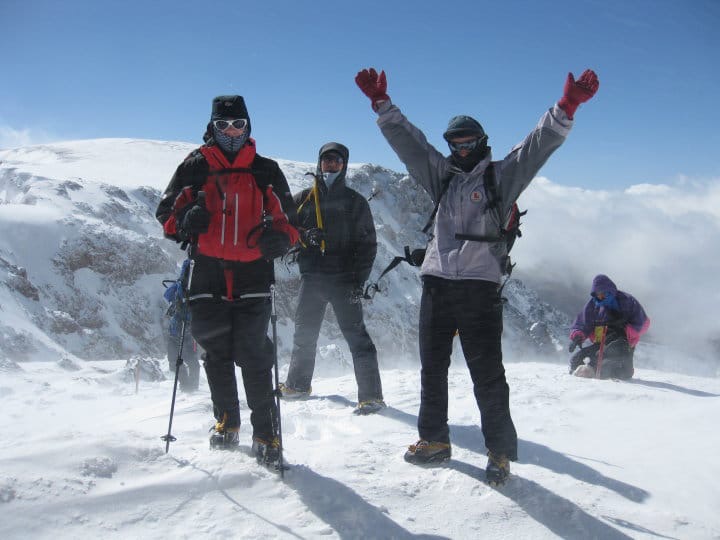Mount Toubkal stands tall above the North Africa plains at 4,167m (13,671 feet). Mount Toubkal is the highest mountain in Morocco, the Atlas Mountains, North Africa, and the Arab World. Its rocky trails, sweeping valleys, and high-altitude summit draw trekkers from across the globe. But here’s the thing — your choice of trekking company can make or break your experience. Check out our upcoming trips.
At Ian Taylor Trekking, we’ve been running luxury-supported climbs to Mount Toubkal for over a decade. We don’t just get you to the summit — we make sure you have the best guides, upgraded accommodation, private rooms in the refuges, and a richer cultural experience along the way. Here’s what you should know before you climb Mount Toubkal, plus how our approach takes your adventure to the next level. Read some reviews from our trips.
Where is Mount Toubkal?
Toubkal, also known as Jebel Toubkal, can be found in the southwest of Morocco, in the appropriately named Toubkal National Park. Standing at 4,167 meters (that’s 13,671 feet), it’s not just the highest peak in Morocco, but in the whole Atlas Mountains, North Africa, and even the Arab world! You can spot this bad boy about 63 kilometers (or 39 miles) south of the city of Marrakesh where you will land at the start of your trip, and let me tell ya, it’s not easy to miss. Toubkal has got some serious bragging rights, being the highest peak for over 1,200 miles. From the summit, on a clear day, you’ll get some awesome views of the Sahara desert.
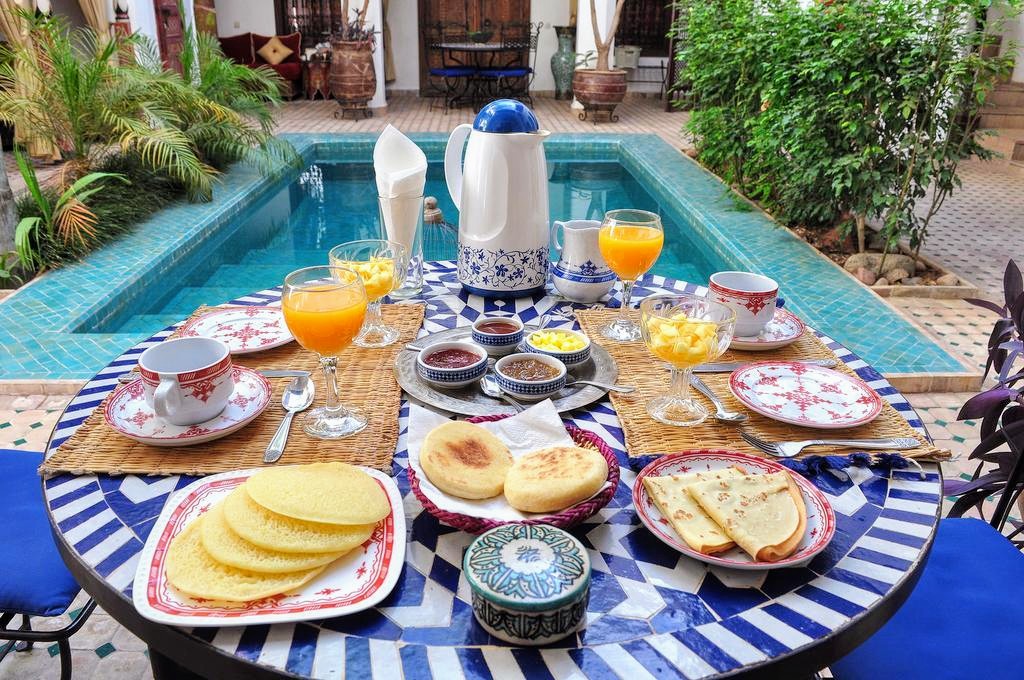
What You Should Know Before You Climb Mount Toubkal
Altitude and Low Oxygen Risks: Mount Toubkal may be “only” 4,167 meters (13,671 feet) compared to Himalayan giants, but the altitude is still high enough to cause problems. Everything over 2,500m (8,200 feet) is considered high altitude. As you ascend, oxygen levels drop by about 40%, which can trigger altitude sickness — headaches, nausea, dizziness, or worse. Acclimatization days, slow pacing, and good hydration are key to staying healthy.
Toubkal is frequently underestimated and just because it’s offered as a two day climb by some operators, a shorter itinerary should only be considered by people who live at altitude. Never underestimate the power, dangers, and challenges of the mountains
The Weather Can Change Instantly: Morocco’s High Atlas mountains are unpredictable. You might start in bright sunshine and end up in snow, rain, or gale-force winds within hours. Always pack quality layers, a waterproof shell, and warm gloves — even in summer. We will send you a full dossier with itemized kit list.
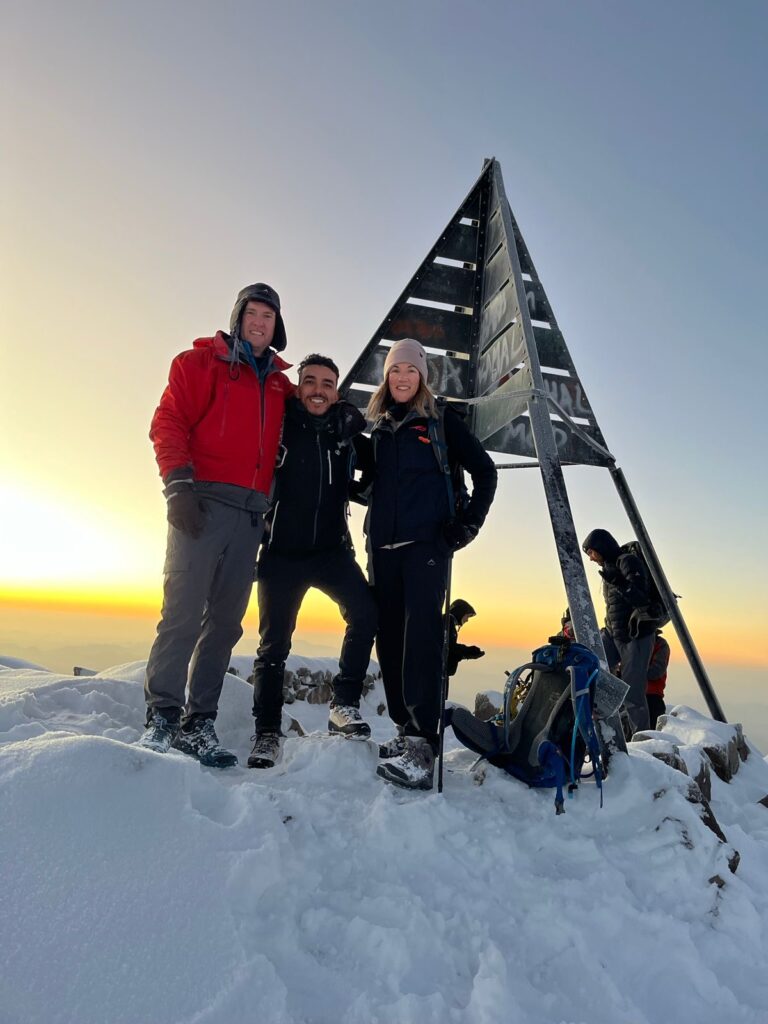
Trail Conditions Vary by Season
From June to September, you’ll find mostly dry trails and warmer temperatures. Winter and spring bring snow and ice, making crampons, an ice axe, and winter mountaineering boots essential. Choose your dates based on your experience level. We can help you decide the best time to visit based on your future trekking and mountaineering goals.
It’s More Physical Than You Might Expect
The ascent from Imlil to the summit involves long days, sustained climbs, and uneven rocky trails. Training beforehand on steep hikes, weighted backpack training days, and endurance sessions in zone 2 will make your climb more enjoyable and safe. If you need further training advice, feel free to reach out at any time.
Your Guide and Support
A well-trained, experienced guide not only knows the safest routes but also understands pacing, weather patterns, and how to spot altitude sickness early. Choose an operator with professional guides, private rooms in the refuges, and a safety-first approach — your success and safety depend on it.
How Long Does it Take to Climb Mount Toubkal?
With the correct acclimatization, Climbing Mount Toubkal is a 5 day event. You can pick cheaper trips that will take you in 2 or 3 days. We opt for a longer more enjoyable experience climbing Toubkal. Our 7 day itinerary is the way to approach this mountain. With the incredible hospitality of the Berber people, it is worth spending more time in the region of Morocco. If you are into peak bagging you are in the wrong place.
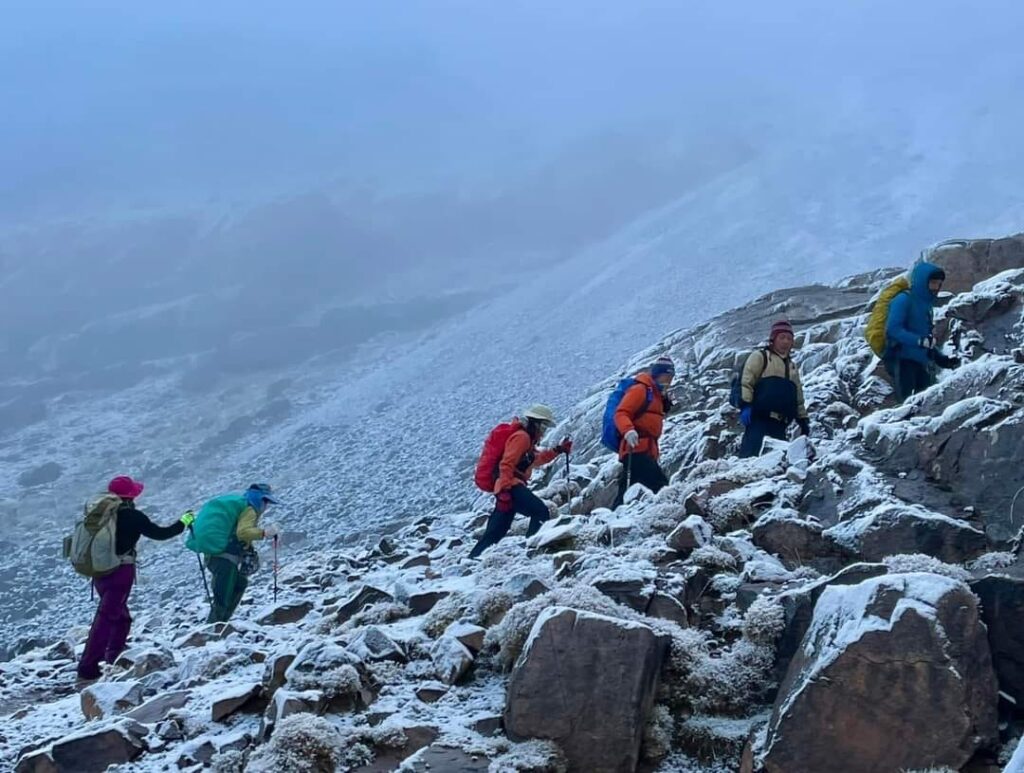
1. Comfort Matters More Than You Think — Especially at Altitude
Most treks to Toubkal involve basic dormitories and shared spaces, which can mean sleepless nights before a big summit push. We’ve changed that. Our clients stay in carefully selected Marrakech hotels, upgraded mountain lodges in Imlil, and private rooms at the refuge whenever possible. This means you can rest properly and focus on the climb, not the chorus of snoring in a crowded bunk room.
2. The Right Gear Makes All the Difference
Good trekking boots in Spring, Summer and Autumn, Mountaineering boots in Winter and high-quality hiking socks are non-negotiable. We’ve seen too many trekkers suffer with blisters because they turned up with brand-new boots or cheap cotton socks. On our climbs, we provide pre-trip gear advice, packing videos, and personalized consultations so you know exactly what works for the Atlas Mountains’ rocky trails and shifting temperatures.
3. Pacing, Hydration, and Acclimatization Are Key
Toubkal may be smaller than Kilimanjaro or Everest, but at over 4,000m the thin air can still cause altitude sickness. We design our itineraries with better pacing and more acclimatization days so your body can adjust naturally. Our professional local guides, will monitor your health throughout the trek to keep you safe and comfortable.
4. Small Groups Mean a Better Experience
With Ian Taylor Trekking, you won’t be lost in a crowd. We run smaller group sizes with higher guide-to-client ratios, meaning more personal attention, better safety, and a deeper connection to the Moroccan Berber culture. Your guide won’t just point to the summit — they’ll introduce you to the mountain’s history, traditions, and hidden viewpoints. We normally have a maximum of 8 people per group.
5. Snacks, Hydration, and Fuel for the Climb
Whether it’s the long ascent to the refuge or the steep pre-dawn climb to the summit, your body needs constant fuel. We advise bringing your favourite high-energy snacks from home, but we also include freshly prepared meals made with locally sourced ingredients. Expect hot tagines, fresh bread, olives, and Moroccan tea to keep your energy high.
6. Winter and Summer: Two Very Different Toubkal Experiences
Best months for trekking Toubkal are April–June and September–November for stable weather, clear skies, and moderate temperatures. Winter ascents (November–April) are colder, require crampons and ice axe use, and offer a more technical mountaineering challenge — something we can fully support with extra mountaineering guides and gear.
7. Why Ian Taylor Trekking Is the Premium Choice for Mount Toubkal
1). Upgraded Hotels & Lodges: Handpicked Marrakech riads and Imlil lodges for maximum comfort.
2). Private Rooms at Refuges: Whenever possible, so you can sleep and recover properly.
3). Professional Local Guides: Trained to international safety standards, with years of experience.
4). Tailored Acclimatization: More time in the mountains for better adjustment.
5). Smaller Groups: A more personal, safe, and enjoyable climb.
6). Fully Supported: From your first email to standing on the summit, our team is with you every step of the way.

What I Wish I Knew Before Climbing Mount Toubkal
Climbing Mount Toubkal is a rewarding adventure, but how you do it shapes your entire experience. Choose a company that values your comfort, safety, and overall journey — not just the summit photo. At Ian Taylor Trekking, we take pride in delivering the highest quality Mount Toubkal treks in Morocco.
I remember going to Toubkal in 2003 before going to Kilimanjaro. I went up and down Toubkal in a weekend. Looking back this was a terrible idea with no benefits and not really experiencing the region, culture or mountain. This experience shaped how we now offer trips with more acclimatization, better support, safety and embracing local culture.
Climb Mount Toubkal
Summit Mount Toubkal, the highest peak in North Africa, on a professionally guided trek through Morocco’s stunning Atlas Mountains. Join a small group of like-minded adventurers for an authentic high-altitude experience led by experienced local guides who know the terrain, culture, and weather patterns inside out. Your trip includes all meals, comfortable accommodation, and private transfers from Marrakech to Imlil, ensuring a seamless journey from start to finish.
Whether you’re drawn by the challenge of standing at 4,167 meters, the sweeping views over the Sahara Desert, or the rich Berber culture along the way, this is an adventure you’ll never forget. In this guide, I’ll share everything I wish I had known before climbing Mount Toubkal, plus essential tips for trekking safely and enjoying every step on the high trails of the Atlas Mountains. Book Now!

Bring Snacks
I normally bring some Clif bloks for the summit night. Three small bags of trail mix and 2 protein bars on Mount Toubkal. It is important to bring energy bars and items with slow release energy. Enjoyed at the right time, a tasty edible treat will lift your mood and energy levels. It can do wonders for you on both the ascent and descent. Just don’t burn through all your snacks on the first day.
The Importance of Good Clothing
With the sun beating down, dusty trails, potential rain, wind and snow you will need very specific gear on Mount Toubkal. We will send you an itemized kit list on signing up. Do not bring any cotton T-shirts, socks or underwear. We have seen people in tears at the Refugio, wishing they had brought better gear and clothing. You will need different pairs of socks, merino is best and you will need to bring compeeds just in case. You should have broken in your trekking boots before this trek.
Break in your new boots
It’s good idea to do some trekking in the boots you’re going to wear prior to climbing Toubkal. We highly recommend ‘breaking in’ new boots at home before travelling to Morocco. This is a process that helps your boots gradually mold to the shape of your feet, softening up the leather or fabric and ensuring the boots flex at appropriate times when you’re hiking.
Climb Mount Toubkal and Sleep in the Sahara
We have a team of expert guides that will help you trek across the beautiful Atlas Mountains in Morocco to Mount Toubkal. In addition to climbing Toubkal, we have side tours you can consider to the Sahara and some unique trips outside Marrakech.
I highly recommend embarking on a mesmerizing overnight journey into the Sahara. Travel via the iconic Tizi n’Tichka Pass into the High Atlas, visit the UNESCO-listed Aït Benhaddou, and explore the dramatic Todra Gorge before a camel trek through the Erg Chebbi dunes. Enjoy a night under the stars in a Berber desert camp followed by a sunrise camel ride—an unforgettable desert experience.
Aït Benhaddou, Ouarzazate & Dades Valley Cultural Tour
Delve into Morocco’s storied past with a journey through the fortified Aït Benhaddou, often featured in major films. Then, cruise through Ouarzazate—known as “Hollywood of Africa”—and explore the winding beauty of the Dades Valley, filled with vibrant red rock landscapes and traditional kasbahs.
Ourika Valley Day Trip
Just 30 km from Marrakech, this lush, preserved valley along the Ourika River delivers waterfalls, riverside cafes, and scenic hiking—an idyllic way to unwind after your Toubkal trek.
Essaouira Coastal Getaway
Enjoy a relaxed finish to your mountain adventure with a visit to the wind-swept Atlantic port of Essaouira. Explore its blue-and-white medina, savor fresh seafood by the harbor, and enjoy ocean breezes—a perfect blend of culture and beachside serenity.
Chefchaouen & Talassemtane National Park Explorer
Venture north to discover the serene “Blue City” of Chefchaouen, perched in the Rif Mountains and famed for its blue-washed streets and traditional markets. Pair it with a day hike in Talassemtane National Park, home to the dramatic Bridge of God and Morocco’s endangered fir forests—ideal for nature lovers seeking tranquility.

Climb Mount Toubkal in Winter
Attempting Toubkal in winter adds another dynamic for the more seasoned adventurer. Conditions can be challenging under foot. You will need to be comfortable in crampons and have the correct clothing and gear. We have expert mountaineering guides ready to lead you to the summit and back safely.
Needless to say, this isn’t your standard walk in the park. The days will be long, challenging and you need excellent endurance and strength for a winter ascent. Mentally speaking, the way down can be harder as you’ll feel like you’ve already achieved what you set out to achieve. Just remember to keep enjoying the incredible views, the brilliant company and the fact you’ve just summited a peak over 4,000m above sea level.
The Refuge
The multi-storey refuge was built in 1938 and houses four dormitories. Most people will be staying in the large dorm spaces. We will be using the private rooms. Depending on how many people in the group you will have access to more private rooms. The Refugio has two double private rooms and three twin private rooms. They also have one quadruple private room and additional room for six people and room private room for 8 people if needed. It is cheaper to stay in the main dorm room but there the capacity is for 150 people which is not the way to go.
Top Tip: Bring earbuds and headphones with you. You may struggle to sleep here due to a chorus of snoring and people getting up to venture to the bathroom.
Top Top Tip: Bring your own toilet roll. There are toilets, but for the fellas you’ll be greeted by a hole in the ground of the cubicle, there are normal toilets but availability can be scarce.
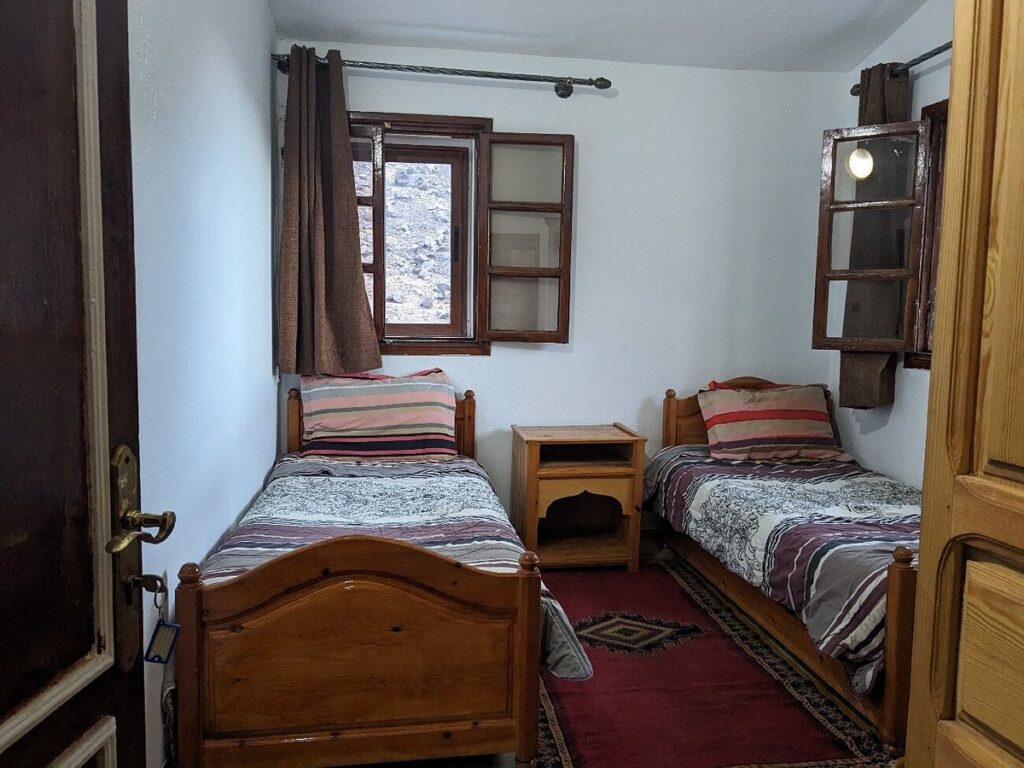
Respect the Altitude
Just because the Atlas Mountains aren’t the Himalayas, and Toubkal isn’t Everest, doesn’t mean altitude sickness isn’t a thing. I have witness serious altitude related issues on Toubkal in other groups. These incidents could have been serious if the people were not turned around. We have turned people on many mountains for not have the physical condition or spotting altitude sickness and HACE. They are go online and write a bad review, but our responsibility is to get people safely have to Marrakech, our duty is not to push people to the summit.
If you feel unwell on the mountain, tell someone straight away. Even if you’re close to the summit, it’s imperative to stop and turn back.
What I would say to anyone thinking about taking on Toubkal is that it’s worth gaining some awareness of altitude sickness before signing up. Knowing the signs to look out for in yourself and others is sensible. The guides you’re with, of course, have a sharp sense for this kind of thing but you’ll make their job easier if you’re on the lookout too. The main symptoms include a headache, loss of appetite, feeling or being sick, feeling tired or exhausted, dizziness and difficulty sleeping.
Drinking alcohol before or during a big climb should also be avoided, and can dehydrate you. This is a proper mountain we’re talking about – so be smart.
Take Some Cash for Tips
The national currency of Morocco is Moroccan Dirham. The dirham is a closed currency, which means it can only be bought once you arrive in the country. My advice would be to get this in the airport and use for souvenirs (there’s a lot you can find in the Souks!) You can use Euro, USD or sterling as tips for your guides and porter/chef in Imlil at the end of your trek. We recommend giving $200. Just give this in an envelope to your guide and he will share it amongst the team looking after you.
You will not be shopping on Mount Toubkal. There are, however, some lovely souvenir stalls on the trail; selling local handcrafted items. Contactless card payment opportunities are, unsurprisingly, rare so it makes sense to have some cash on you. If you are looking to buy something from one of these friendly vendors, we would – for obvious reasons – recommend doing so on the way down rather than the way up. You can also tip the guides and team on the last day of the trek back to Imlil.
Whilst in the city of Marakech at the start and or end of the trek, cash points are all around the city. I had no problem withdrawing cash from these for food and so on. Just let your bank know before you do it!
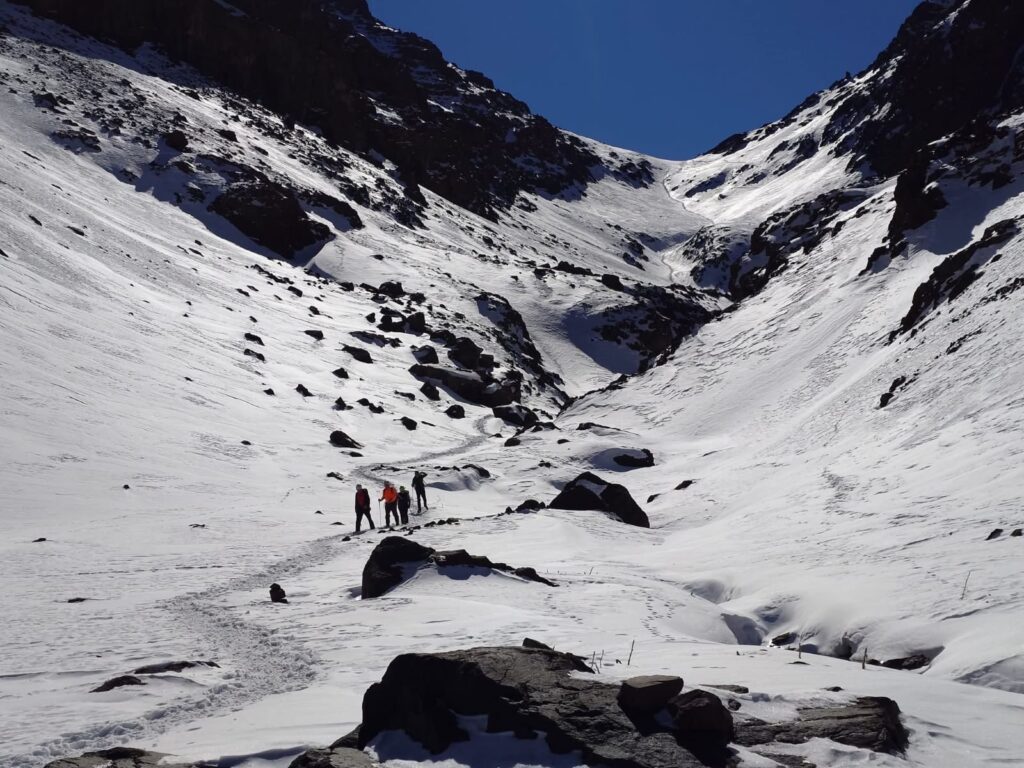
More Trekking Options in Atlas Mountains of Morocco
In addition to standing on the summit of Toubkal. We offer unique treks and trips across the Atlas Mountains with the support of our experienced guiding team we can have tailor made itineraries to suit your needs.
1). Toubkal Circuit Trek
For trekkers who want more than a straight summit push, the Toubkal Circuit offers a multi-day loop around the high peaks of the Atlas. You’ll visit remote Berber villages, traverse dramatic passes such as Tizi n’Ouagane, and camp in stunning alpine valleys—an excellent way to experience the less-visited side of Morocco’s highest mountains.
2). Azzaden Valley & Tizi Oussem Trek
A quieter and greener alternative to the main Toubkal route, this trek takes you into the spectacular Azzaden Valley, known for its terraced fields, waterfalls, and warm Berber hospitality. Staying in traditional village guesthouses, you’ll cross Tizi n’Mzik Pass for incredible panoramic views.
3). Ouanoukrim Peaks Ascent
The second and third highest mountains in Morocco—Timzguida (4,089 m) and Ras Ouanoukrim (4,083 m)—are often overlooked but provide a thrilling non-technical climb for those acclimatized from Toubkal. The ridge walk between the summits offers some of the best views in the entire High Atlas.
4). M’Goun Massif Trek
Located in the central High Atlas, the M’Goun Massif offers a wilder, less-crowded trekking experience. The trek passes through deep gorges like Mgoun Gorge and traditional Aït Bougmez villages, giving a raw and authentic feel. Ideal for trekkers seeking cultural immersion and dramatic landscapes.
5). Lac d’Ifni & Tizi n’Ouanoums Pass
This adventure takes you to the beautiful Lac d’Ifni, the only large mountain lake in the High Atlas, sitting at 2,295 m. Surrounded by steep slopes, it’s an oasis of calm in the rugged landscape. From here, you can cross the Tizi n’Ouanoums Pass (3,664 m) back toward Toubkal base, creating a loop route rich in scenery and challenge.
Our Unique Toubkal Service and Itinerary
Day 1 – Arrive at Menara Airport of Marrakech. Our guide and driver will meet you for the short transfer to your 4* hotel. After a welcome cup of fresh mint tea and Moroccan pastries, the guide will do a briefing with you to talk through the days to follow as well as to go over some local rules/traditions to follow while you are in Morocco. If time allows, you can explore the old parts of the Medina such as Bahia palace, Majorelle Garden, Koutoubia Mosque and More.
Day 2 – We will leave the busy city behind us this morning and drive south towards the craggy peaks and plunging valleys of the Toubkal Massif. Crossing the Haouz Plain, we pass through the tiny town of Asni, from where our road begins to climb towards the foothills of the Massif. Below us the valley of the Oued Gheraya stretches out into the distance and small villages cling to the sides of the steep hills as we meander. We should arrive to Imlil by midday, and after lunch you will have time to walk into one of the surrounding passes or Villages as a warmup for the next day. Overnight in a guesthouse/Riad, breakfast, lunch and dinner included. 2 to 3 hours walking today. There is an optional cooking class that you can join in the afternoon with our Berber chef – free of Charge.
Day 3 – Today we will start our trek, heading along the Mizane Valley, first towards the village of Aremd and then onto the shrine of Sidi Chamarouch. Built on a moraine spur overlooking the valley floor, Aremd is the largest village in the valley and provides an interesting mix of traditional terraced farming, gites and streets that seem to be permanently gridlocked by goats and cattle.
For generations, the local Berber villagers have worked these lands, producing corn, potatoes, and walnuts in the harsh landscape. Continuing east and crossing the flood plain, our route takes us along mule tracks and up into the high rocky cliffs above the valley. Crossing the river, we eventually come to the pastoral shrine of Sidi Chamarouch, which attracts tourists and pilgrims alike (although only Muslims are allowed to cross the stone bridge to visit the shrine itself).
The village sits beside a small waterfall, a jumbled cluster of houses that seem to melt together into an anarchic mass. From here the trail continues to climb steadily, snaking and zigzagging its way up to the snowline, and the Toubkal Refuge at 3,200m/ 10,498 feet, our stop for the night. Approx 5hrs hiking and 11km/6.8mi. Breakfast, lunch and dinner are included today.
Day 4 – Today is an additional acclimatization day built into the itinerary. We will take the trail, which traverses uphill, to the famous Tizi Ouanoumss Pass at 3,600m/ 11,811 feet. From here, you will be rewarded with stunning views, overlooking the lush Tifnout Valley and Ifni Lake at 2,500m/ 8,202 feet. After enjoying the surroundings, we will return back to Base Camp. The total distance today is 8km/4.9mi. Breakfast, lunch and dinner are included today.
Day 5 – Early in the morning, we will make our attempt to climb the summit of Jebel Toukbal, the highest peak in Northern Africa. Our route takes us up the south cirque, crossing the stream above the refuge and then heading across one of the mountains numerous scree fields, where we will have to negotiate a seemingly endless carpet of boulders and rocks.
The walking is relatively straightforward, but the scree and the altitude will make the going quite difficult in parts, however, the views along the way make the journey more than worthwhile. Cresting the ridgeline, we find ourselves on the plateau, from where it is a short walk to the summit and the vistas out across the surrounding landscape are breathtaking.
From here there are unrestricted views in every direction, from the Marrakesh Plain to the High Atlas in the north and as far south as the Anti-Atlas and the Sahara. After taking our time enjoying the views and our accomplishment, we will descend back to the Refuge and stay overnight. Today will be a challenging day with 8k/4.9mi of steep and challenging terrain. Breakfast, lunch and dinner are included today.
Day 6 – After Breakfast at the Basecamp, a pleasant descent takes us from an arid mountain landscape to the irrigated valleys below. We will follow the trail through Sidi Chamharouch (marabout) to the beautiful, cultivated area of Aremd 1,900m/ 6,233 feet before we reach Imlil. This will be another 11km/6.8mi day for our final hike! From here, we will be picked up in private transport for the one-and-a-half-hour drive back to Marrakech and our hotel for the night. We will have a team dinner tonight in the city to celebrate our success! Breakfast, lunch and dinner are included today.
Day 7 – Today is the final day of the itinerary and we will pick you up at the hotel and transfer you back to the airport for your onward journey! You may choice to take on some of side trips in the region and we have some options available for you. Contact us for more information. If now you may have time to once again experience the sights, sounds and colors of Marrakech before starting your homeward journey Breakfast included today.
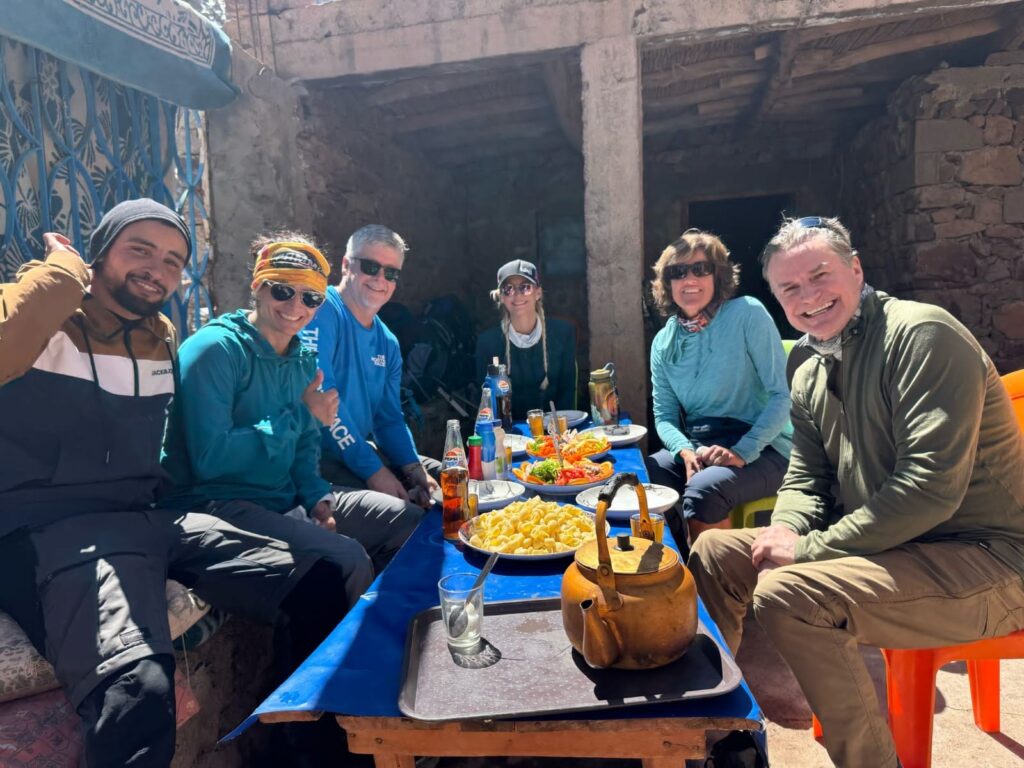
What You Should Know Before You Climb Mount Toubkal
What time of year should I climb Mount Toubkal?
For optimal conditions and safety, consider tackling Mount Toubkal during the spring and autumn months. April to May and September to October are popular times of year to climb Toubkal, the weather is much more predictable, it’s not too hot and not too cold. You’re more likely during these months to get clearer views too.
Around April and May, the winter snow usually starts to melt away, making the trails way easier to tackle. When I submitted in April, the snowline started a little before reaching the refuge base camp and we only needed to wear crampons on the summit night. There was snow all the way up the summit, but it wasn’t icy and the weather was clear and bright as we ascended to the top. Come September and October, it’s all dry and well-traveled, so you won’t find yourself slipping and sliding, allowing you to soak in the scenery hassle-free.
Winter climbs in October to the end of April offer a unique and challenging experience but require additional preparation and caution. I have climbed over 15 time in winter. There can be dangerous Icey conditions under foot and on the summit push, the wind chill is chilling. I have seen it as low as -15 Celsius or 5 degrees Fahrenheit. So be sure to come with the correct layers and down jacket for a winter ascent on Mount Toubkal.
How to Book Your Flights for Morocco
If you are flying in from the US, Australia, New Zealand or anywhere outside of Europe, consider a couple of additional days. You will be jetlagged and this will affect the experience you have on the mountain. If you are coming from Ireland, UK or any European country, you will be fine to arrive on the first day of the trek. The first day our the itinerary is designed with arrivals in mind. The airport you will book your flights to will be Marrakech Menara International Airport. Check our skyscanner, Expedia or google flights for options. You can also look at your favorite airline or options.
Departure wise, the final day of our trip is known as the ‘departure day’ – doing what it says on the tin – so you can book your flight home for this day. However, if you would like to join one of our side tours in Morocco we can set that up for you. In Marrakech, there are some unique sights, roaming round the Souks (markets) or enjoying some relaxation after your trek – that is no problem at all! You can book your arrival or departure flights for any date either side of a trip and we can still arrange airport transfers and any extra accommodation you require.
What You Should Know Before You Climb Mount Toubkal
Food and Accommodation
Whilst on the trek to Toubkal you won’t be going hungry, Morocco is well known for Tagine. This is essentially a big casserole pot full of veg and meat. You’ll be served a variation of this most of the time with plenty of bread, pasta and olives. Our food and service is second to none.
For breakfast you’ll usually be treated with some tasty pancakes. You’ll have plenty of options with this, including yogurt, eggs and bread.
The accommodation on the Mount Toubkal trip is a combination of hotel, lodge and refuge and depending on the time of year and weather conditions, you have the option to camp at the Refuge Base Camp.
Once you arrive in Marrakech, on our seven day trip you will be met at the airport by an Ian Taylor Trekking representative who will take you to our four star hotel. There are some awesome hotels, usually with a rooftop terrace you can do a bit of sunbathing on, you’ll also have some awesome views of the city.
You’ll then stay at Imlil riad where your trek really begins. This riad in the village of Imlil is surrounded by incredible views. Here you’ll find a dining area with a log fire, comfortable bedrooms with showers. This is where you’ll begin and end your trek.
The Base Camp lodge is a basic stone building, once your eye have adjusted to the darkness in their you will find a main common area, and it’s usually bustling with adventurers so expect to be sitting shoulder to shoulder in the popular months. The sleeping arrangements are pretty basic, each room is filled with bunk beds with mattresses. Our teams will be using the private rooms with comfort than the communal areas.
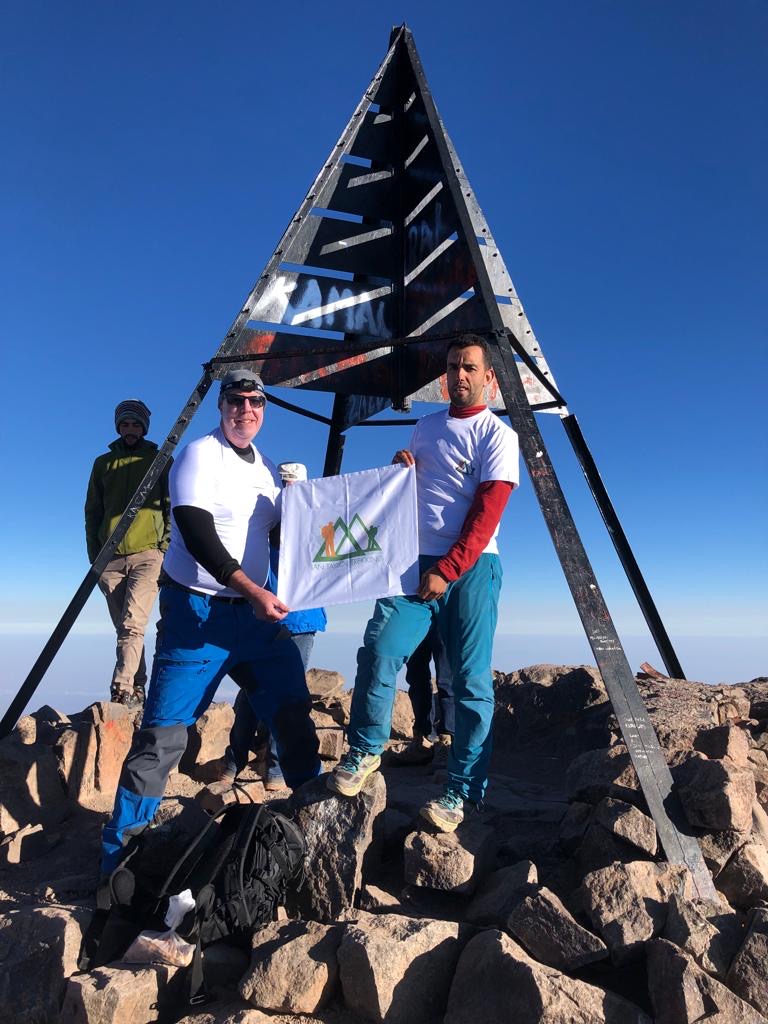
What You Should Know Before You Climb Mount Toubkal
How Training do you Need for the Mount Toubkal Trek
You don’t have to be an athlete to take on Mount Toubkal, but a certain level of physically conditioning is essential. The better condition you are in, the more you’ll enjoy it. The best training you can be doing is in zone 2 heart rates with a backpack building up to carrying 110kg/22lbs
If you can hike continuously for 4 hours in a day with a backpack, getting in 700m/ 2,300 feet if should be ready. We have a great tester trail here in Colorado if you are interested in testing out your training for Mount Toubkal. Ideally, you should be able to hike for consecutive days for this length of time. In addition to this, training on back to back days will be a major benefit. The altitude is manageable if you keep on top of hydration, make sure you have some diamox handy just in case.
Could Toubkal be my First Winter Ascent?
Mount Toubkal can be an amazing first venture to the high peaks before heading on other treks like Kilimanjaro. If you choose to climb Toubkal during winter, any previous winter mountaineering experience is ideal. We have courses in Colorado and Scotland available if you would like to come prepared. Having tested your gear in the cold and being comfortable with using an ice axe and crampons is a major plus.
If you want to have some pre-trip experience in winter conditions, check out our Scotland Winter Skills training weekends. These are the perfect training days to familiarize yourself with crampons and using Ice axes.
So, in short the fitter the better. It is however a mental game also. I found on my first experience with Toubkal I struggled mentally. I was not in a good headspace at the time and had gone in thinking it would be a breeze. Boy was I wrong. So perhaps look at some mental resilience exercises and things you can do in your mind to make the journey easier to deal with if things get tough for you, and there’s no shame if you are struggling. None at all.
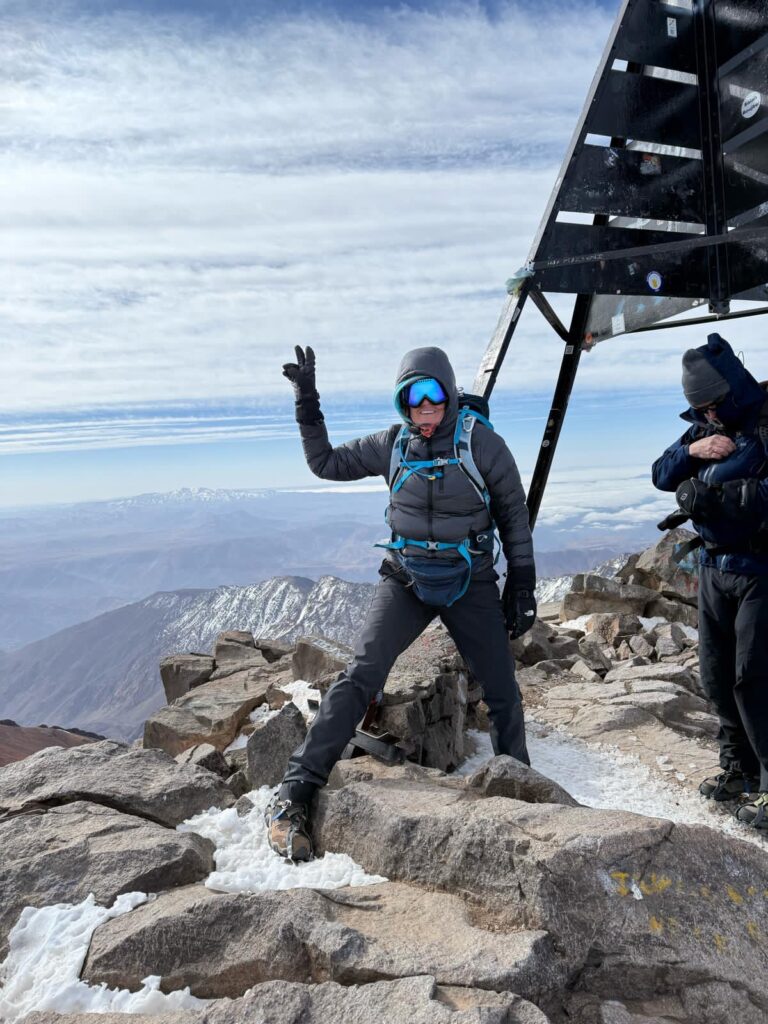
What Vaccinations do you Need for Morocco?
So, what do you need? You should review what the CDC recommends for travelling to Morocco. From what we’ve experienced on our adventures, you should consider the following: Typhoid, Cholera, Diphtheria and Tetanus. Then there’s Hep A and Hep B, just to be extra safe.
Do you need a Visa to travel to Morocco?
Short answer. No. If you are a US, Irish, Canadian, UK, Australian passport holder you don’t need to apply for a VISA to enter Morocco. But obviously make sure your passport has a minimum of 6 months before expiry. Check requirements at the time of booking as this may change.
Whilst on the trek, you will be required to keep your passport on you as you may pass some police checkpoints on the way, so be sure to get yourself a chest wallet or something waterproof you can safely store your passport, wallet and even your insurance.
What to Pack for Your Mount Toubkal climb
The biggest question of all! What do I need for this trek? So, on this adventure you will need a wide range of gear. On signing up we send you our 40 page dossier with itemized kit list so you know exactly what to bring. You will need a duffel bag to keep everything together. You will also need a backpack where you can carry a few layers, waterproofs, water and snacks.
The limit for your duffel bag should be 15kg/33lbs. Your duffle bag will be carried by a mule to the refuge and back to Imlil. So really you want to make this as light as possible for their sake, but don’t worry you can leave items in a safe place in Imlil if needed.
So what essential items do you need? I’ve listed some of our recommendations below for you.
Backpack – Aim for a 30 Liter size to carry your daily essentials.
Duffel bag – 100L Duffel Bag
Trekking Boots – These boots need to have good ankle support
Trainers – For around the lodge and refugio
Base Layers – One pair top and bottom
Mid fleece layer – I like the Patagonia Nano jacket
Waterproof jacket – Full Goretex
Down jacket – Midweight
Sun hoody – great to keep the sun off your neck and arms
Trekking pants – I recommend getting some that unzip into shorts for the hotter months
Gloves + liners – You will need warmer gloves than you think
Water Bladder – 2 liter bladder is essential
Nalgene water bottles – Bring 2 one liter nalgene’s
Trekking poles – Leki or black diamond are a great brands for poles
Sunglasses – Category 3 or 4
Sun hat – Baseball hat works well with a sun hoody
Beanie – lightweight
Sunscreen/lip balm – Factor 30
Toilet paper – 1 roll is enough
Hand sanitizer/wipes – 1 small hand sanitizer and 1 small packet of baby wipes
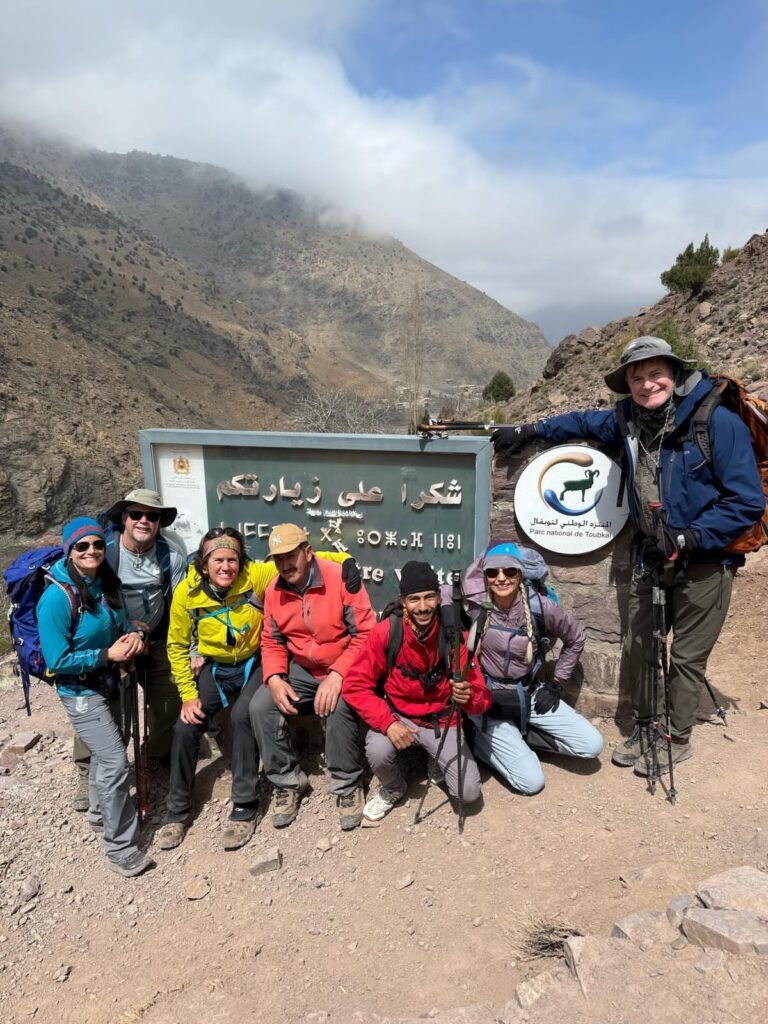
There’s obviously other items and toiletries that can be added to your list depending on preference, but with these essentials for the non winter months, you’ll manage just fine. We will provide you will a full kit list on signing up. We also have some items for rent from our office in Marrakesh. Our team in Morocco will deliver them to you upon arrival.
Join the Experts!
If you’re planning to climb Mount Toubkal and want an upgraded trekking experience with better accommodations, expert local guides, private rooms in the refuges, and full support from start to finish, join us at Ian Taylor Trekking. We’ve been leading high-quality climbs in the Atlas Mountains for over a decade, and our dedicated team will ensure you have a safe, comfortable, and unforgettable adventure. Contact us today to secure your spot on one of our premium Mount Toubkal treks.
